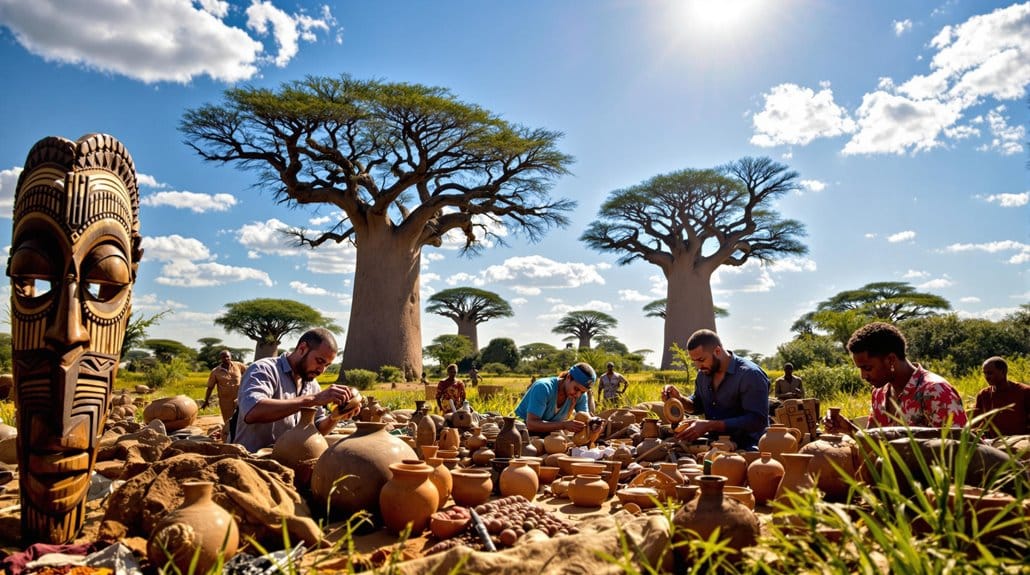Consider a village in Kenya where traditional bead-making is fading, threatening not only the craft but also the community's identity. You might wonder how prioritizing best practices in African heritage management could change this narrative. By focusing on effective preservation strategies, we can guarantee that such cultural expressions thrive, fostering empowerment and sustainability. What steps can be taken to integrate local voices and contemporary methods into heritage management?
Key Takeaways
- Best practices in African heritage management promote the preservation of Intangible Cultural Heritage, vital for community identity and values.
- Effective heritage management enhances compliance with global standards, ensuring legal frameworks support cultural preservation.
- Community engagement fosters socio-economic benefits and strengthens local connections to heritage, leading to sustainable management practices.
- Capacity-building initiatives empower communities with knowledge, enabling them to address heritage challenges and fragmented practices.
- Integrating traditional knowledge with modern approaches, including digitization, enhances accessibility and encourages diverse audience engagement.
Importance of Intangible Cultural Heritage
In understanding the essence of African cultural identity, you can't overlook the significance of Intangible Cultural Heritage (ICH). ICH shapes not just individual identities, but shared values that bind communities together.
With 50 States Parties adopting the 2003 Convention to safeguard this essential heritage, the call for cultural preservation has never been more urgent. Currently, 88 elements of ICH are inscribed, yet 22 sit on the Urgent Safeguarding List, signaling a need for immediate community involvement and targeted action.
Education plays a significant role in this process. Capacity-building programs supported by UNESCO in 45 African countries since 2009 emphasize the importance of ICH education, raising awareness and appreciation among communities.
Successful initiatives in Uganda and Kenya show how integrating living heritage into local educational frameworks can enhance cultural transmission across generations.
Recognizing and safeguarding ICH is fundamental not only for preserving cultural identity but also for achieving broader objectives outlined in the African Union Agenda 2063 and the 2030 Agenda for Sustainable Development.
Current State of Living Heritage
Across Africa, the current state of living heritage reflects both the vibrant cultural practices that define communities and the urgent need for their preservation.
With 88 elements of living heritage inscribed by African States Parties, including 65 on the Representative List and 22 on the Urgent Safeguarding List, the importance of safeguarding intangible heritage is clear.
UNESCO's capacity-building programs in 45 African countries are pivotal in enhancing these efforts, ensuring that cultural practices are transmitted across generations.
Educational initiatives in Uganda and Kenya illustrate effective ways to integrate living heritage into local contexts, fostering awareness and appreciation among younger generations.
Projects like the one in Benin, funded at US$ 80,000, focus on education as a means to safeguard intangible cultural heritage.
Similarly, Malawi's initiative received US$ 117,460 to promote non-formal learning centered on living heritage.
These community engagement efforts not only underscore the significance of intangible heritage but also contribute to socio-economic development.
Education's Role in Heritage Management
Education plays a pivotal role in the management of heritage by fostering a deeper understanding and appreciation of cultural practices. In African countries, initiatives aimed at enhancing awareness of intangible cultural heritage have shown remarkable success. For instance, projects in Uganda and Kenya underscore the importance of integrating living heritage into educational systems, ensuring that future generations value their cultural roots.
Investment in heritage education is essential, as demonstrated by the US$ 80,000 Benin project aimed at safeguarding intangible cultural heritage. Similarly, Malawi's non-formal learning initiative, funded at US$ 117,460, emphasizes the transmission of living heritage. These efforts highlight the need for context-specific strategies tailored to local contexts, making education an effective tool for heritage management.
Moreover, capacity-building programs have supported 45 African countries since 2009, reinforcing education's role in nurturing effective heritage management practices. By focusing on education, communities can better utilize their heritage resources, fostering a sense of belonging and identity.
Ultimately, prioritizing education in heritage management not only cultivates awareness but also empowers individuals to actively participate in preserving their unique cultural legacies.
Legal Frameworks and Compliance
A robust legal framework is vital for effective heritage management in Africa, as it establishes the guidelines and protections necessary for preserving cultural legacies.
Across African countries, legal requirements for heritage impact assessments vary widely. Nations like Botswana recognize distinct heritage protections, while others, such as Uganda, depend on environmental frameworks.
Many still operate under colonial legal systems, hampering the management of both tangible and intangible heritage.
There's a growing need for compliance with global heritage standards, which is driving a shift toward thorough legal frameworks.
Few countries incorporate indigenous knowledge into their policies, but Rwanda and Burundi stand out with their progressive approaches.
Legal reforms are significant for integrating these practices, enhancing community engagement, and fostering sustainable preservation efforts.
Community Engagement and Indigenous Practices
Effective heritage management doesn't just rely on legal frameworks; it thrives on the active involvement of local communities and the integration of indigenous practices. When you engage with local populations, you foster a sense of local ownership, making them stewards of their cultural heritage.
Take Zimbabwe's CAMPFIRE program, for example; it exemplifies how community-based natural resource management can revitalize heritage sites through sustainable practices.
The legacy of colonial frameworks has often alienated these communities from their heritage, highlighting an urgent need for reforms. By prioritizing bottom-up approaches, we can redefine heritage narratives that honor traditional systems, allowing local voices to resonate over Western constructs.
Emphasizing intangible heritage as crucial for cultural identity reinforces the importance of community involvement in safeguarding practices that transmit living heritage across generations.
Integrating indigenous practices into heritage management not only enriches the preservation process but also strengthens the community's connection to their environment.
Economic Impacts of Heritage Management
Heritage management isn't just about preservation; it can greatly drive economic growth through tourism and community engagement.
By leveraging World Heritage sites, you can see how local economies flourish and communities develop sustainable strategies for their resources.
This interconnectedness between cultural heritage and economic opportunities highlights the importance of community-driven initiatives in fostering long-term benefits.
Heritage and Economic Growth
The intersection of heritage management and economic growth reveals a dynamic relationship that can transform local communities. By focusing on World Heritage sites, you can harness tourism as a powerful economic driver, creating job opportunities and stimulating local economies.
The African Development Bank highlights that aligning heritage conservation with sustainable development initiatives not only preserves cultural identity but also meets local socio-economic needs.
Community engagement is essential in this process. When locals are involved, they take pride in their heritage, fostering a sense of belonging and responsibility. This engagement can lead to entrepreneurial ventures that leverage heritage, turning history into viable economic opportunities.
For example, the adaptive reuse of spaces like Robben Island's Medium B prison into learning centers exemplifies how heritage can be integrated into functional spaces, benefiting both the economy and cultural significance.
Ultimately, prioritizing effective heritage management fosters a robust connection between cultural preservation and economic growth. As you explore these opportunities, remember that nurturing local communities through heritage can pave the way for sustainable development and vibrant cultural identities, enriching both lives and economies.
Community-Driven Development Strategies
In recent years, community-driven development strategies have emerged as essential components in managing Africa's rich heritage. By emphasizing local engagement, these strategies reveal significant socio-economic benefits while fostering sustainable tourism initiatives that can transform communities.
Consider the following aspects of effective community-driven heritage management:
- Empowerment of local youth through initiatives like the African World Heritage Regional Youth Forum, linking conservation to economic opportunities.
- Support for marginalized groups, as seen in the Robben Island Museum's provision of free trips and funeral grants for ex-political prisoners' families.
- Job creation and economic development through the adaptive reuse of heritage sites, preserving cultural identity while meeting modern needs.
- Successful community-based natural resource management (CBNRM) projects, such as CAMPFIRE in Zimbabwe, showcase how local participation can enhance conservation efforts and improve livelihoods.
Global Standards and Knowledge Sharing
Global standards play an essential role in shaping effective practices for managing African heritage, particularly through frameworks like UNESCO's 2003 Convention for the Safeguarding of Intangible Cultural Heritage.
These standards foster community engagement, recognizing the importance of indigenous heritage in heritage management. However, the effectiveness of these measures can vary, often hindered by top-down decision-making that overlooks local needs.
Without thorough legal frameworks, many African countries struggle to implement necessary safeguarding measures. Adhering to global standards becomes critical to guarantee that cultural heritage is protected effectively.
In addition, knowledge sharing practices across Africa remain fragmented, with much heritage data unpublished and under-resourced. This gap highlights the need for improved frameworks for archiving and sharing information.
Increased capacity-building programs have been significant since 2009, supporting 45 African countries in aligning local heritage management practices with global standards.
These initiatives not only enhance knowledge sharing but also empower communities to engage actively in preserving their cultural heritage.
Future Directions for Heritage Practices
Steering the future of heritage practices in Africa requires a dynamic blend of traditional knowledge and innovative management strategies that actively involve communities.
By embracing a holistic approach, you can contribute to preserving cultural identities while addressing contemporary challenges, such as climate change.
To effectively shape this future, consider the following key directions:
- Integrate Traditional Knowledge: Elevate indigenous practices by incorporating them into heritage management, ensuring respect for local cultures.
- Embrace Digitization: Leverage technology to enhance access to heritage data and engage diverse audiences, combating under-representation in global frameworks.
- Foster Collaborative Approaches: Work alongside neighboring nations to develop new heritage typologies, like African Living Heritage (ALH), that celebrate local traditions.
- Advocate for Legal Reforms: Support changes that integrate indigenous management systems, facilitating sustainable community engagement in heritage preservation.
These strategies not only enhance community involvement but also promote sustainable practices that honor Africa's rich cultural tapestry.
As you navigate this evolving landscape, remember that fostering connection and belonging is key to ensuring the longevity of Africa's heritage.
Frequently Asked Questions
Why Is It Important to Manage Cultural Heritage?
Managing cultural heritage enriches your community's identity, fosters social cohesion, and empowers locals. It creates economic development through tourism, enhances educational opportunities, and preserves intergenerational knowledge, ensuring historical awareness while promoting sustainable practices for future generations.
Why Is Heritage Important in Africa?
Heritage in Africa shapes your cultural identity, fosters community pride, and promotes social cohesion. It drives economic development through tourism potential, enriches educational value, supports environmental sustainability, and preserves intergenerational knowledge, enhancing global diversity.
Why Is Cultural Heritage Preservation Important?
Cultural heritage preservation strengthens your cultural identity and community pride while fostering social cohesion. It enhances historical significance, promotes tourism potential, provides economic benefits, and nurtures intergenerational knowledge, artistic expression, and environmental sustainability through educational value.
Why Is It Important to Support and Promote Local Heritage?
Supporting local heritage fosters community engagement and identity preservation, enhancing social cohesion and cultural diversity. By promoting educational initiatives and sustainable practices, you boost economic development and tourism, while strengthening intergenerational connections through shared local knowledge.
Conclusion
In prioritizing best practices in African heritage management, you're not just preserving the past; you're empowering communities for the future. As the saying goes, "It takes a village to raise a child." By engaging local voices and embracing modern strategies, you can guarantee that vibrant traditions thrive. Together, you can foster cultural appreciation and sustainable development that resonates across generations. Let's champion these practices to celebrate Africa's rich heritage and build a more inclusive future.








